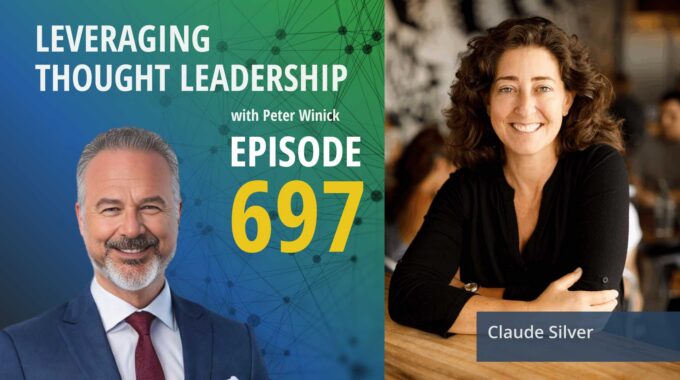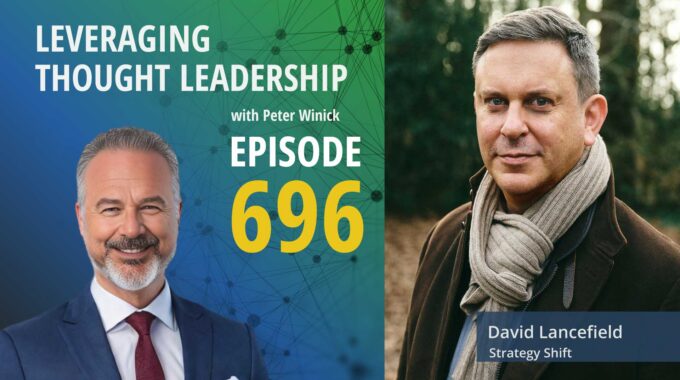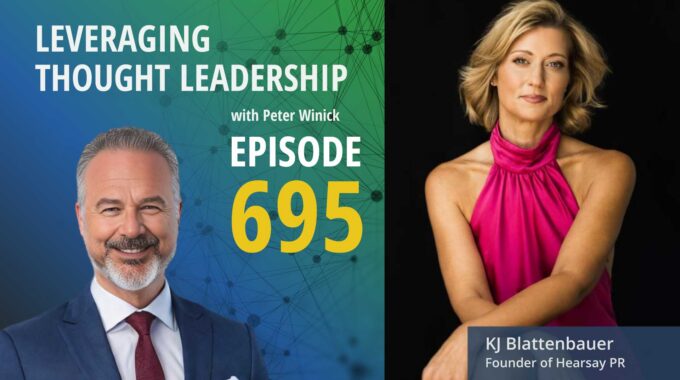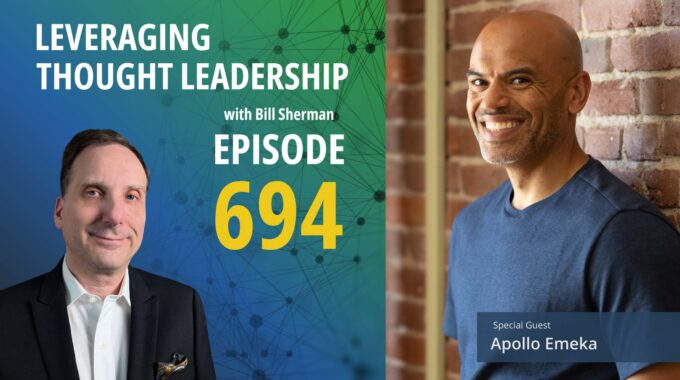Frameworks for connection, accountability, and performance This episode examines how psychological safety drives performance, how…
Think Big, Act Bigger: The Power of Mindset and Systems | Dre Baldwin
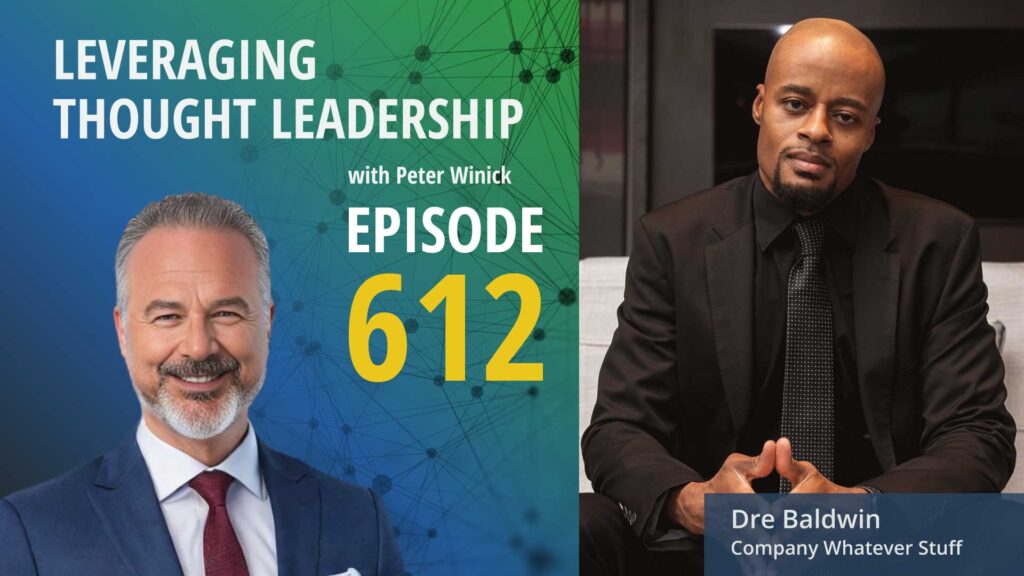
Scale Your Impact: The Secret Sauce of Frameworks and Consistency
In this episode of Leveraging Thought Leadership, Dre Baldwin, CEO of Work on Your Game, reveals how frameworks, mindset, and systems are the keys to scaling success. From shifting mental habits to building repeatable processes, Dre shares actionable insights that empower leaders to turn ideas into lasting impact.
How do you turn ideas into impact and expertise into action?
On this episode of Leveraging Thought Leadership, Peter Winick speaks with Dre Baldwin, Founder and CEO of Work on Your Game. Dre is a four-time TEDx speaker, author of 35 books, including “The Third Day: The Decision that Separates the Pros from the Amateurs” and the creator of the Work on Your Game framework. Together, they unpack the critical role frameworks play in scaling ideas and ensuring consistency. Dre shares how frameworks act as guardrails, anchoring your principles and making your work repeatable and impactful across topics and audiences. Dre emphasizes the power of mindset as the foundation for success. A shift in thinking sparks changes in actions, which in turn drive outcomes. Skipping this sequence leads to frustration, wasted resources, and unmet goals. Whether you’re an athlete or an entrepreneur, Dre insists the process starts in your head. From there, strategies and systems create a path for repeatable success. Systems aren’t just efficient—they’re liberating. Build it once, and you can focus on execution and innovation. 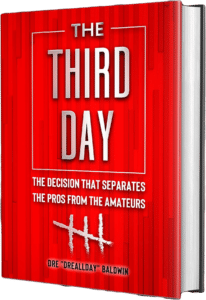
Dre’s own journey began with a realization: the clock on a professional basketball career runs out fast. Embracing his inner tech enthusiast, Dre leveraged the internet to bypass gatekeepers and build his brand. Blogging, YouTube, and podcasting became his tools to connect directly with an audience eager for his insights. His approach? Show up consistently and deliver value based on real-time audience needs. It’s a formula he’s honed into a repeatable system, and it’s working.
Writing 35 books might seem Herculean, but Dre demystifies it with a system that maximizes today’s tech. From dictation to transcription, he’s found ways to streamline the creative process while staying true to his ideas. The tools evolve, but the challenge remains the same: having something meaningful to say and a receptive audience. For Dre, systems make the execution scalable—but only if you start with a strong mindset and clear strategy.
Three Key Takeaways:
Frameworks Anchor Success: A strong framework acts as a guide, keeping your work aligned with your principles and making it repeatable. It ensures consistency and clarity across topics and audiences, which is essential for scaling impact.
Mindset Drives Results: Change starts in your mind. Adjusting your thinking leads to better actions, which then create meaningful outcomes. Skipping the mindset step results in frustration and wasted effort.
Systems Simplify and Scale: Whether writing books or building a business, systems are the key to efficiency. Once a system is in place, you can focus on execution and innovation, letting the process do the heavy lifting.
Dre does a great job of illustrating why changing mindset is so important to creating long lasting impact. For additional information on Changing Mindset and Building Skills take a look at this article by Thought Leadership Leverage CEO Peter Winick.
Transcript
Peter Winick And welcome, welcome, welcome. This is Peter Winick. I’m the founder and CEO at Thought Leadership Leverage. And you’re joining us on the podcast today, which is Leveraging Thought Leadership. Today, my guest is Dre Baldwin, and Dre is the CEO and founder of Work on Your Game. He’s given four Ted Talks on discipline, confidence, mental toughness and personal initiative. He’s authored 35 books. That’s interesting. He’s been in national campaigns with the likes of Nike, Wendy’s, Gatorade, Buick published over 8000 videos, 242,000 subscribers. He’s got a master class, and he invented the work on your game framework as a roadmap in reverse. Welcome aboard, Dre. How are you, man?
Dre Baldwin Well, thank you for having me on, Peter. Hopefully I can live up to that intro. I’m doing great. Yeah.
Peter Winick There we go. If not, I’ll introduce you to yourself again. So. Okay, so I want to start maybe in a bit of a weird place, but I love that sort of at the tail end of your bio and some of the stuff I was looking at before I got on today talked about the framework, right? So lots of authors and thought leaders, you know, they put stuff out there and in the absence of a framework, it makes it really hard, if not impossible, for people to replicate outcomes or a process or a system. So tell me, you know, in your world, like the importance of a framework.
Dre Baldwin Men and everything, because for me, I create a ton of material. I create a lot of concert weather even back in the days as an athlete and nowadays and thought leadership and business world, the frameworks basically kind of keep me contained. They’re kind of like the guardrails within which I can share whatever it is and I’m sharing. So being that I have that framework, I can take anything that happens basically and bring it back to that framework. So I could take stay.
Peter Winick There for a second because a lot of folks that you talk to, the scariest thing in the world for a creator, whether that’s a thought leader or an artist or whatever, is the literal blank page or the blank canvas, because you look at that, you know, we’ve all got a million ideas bouncing around in our head. And today I’m going to write about, I don’t know what the Olympics and tomorrow I’m going to write about this great meal I had. And it’s all over the place. But the beauty and this a little counterintuitive is the more constraints you have and that sort of framework does, the easier it will. Look at that page and say, Ah, even if I did have a great meal back know last night, how can you know in your world do the framework of the mental toughness it takes to put a beautiful meal out in a high pressure restaurant or something like that?
Dre Baldwin Exactly right. So it’s how does this fit within what you’re about? And that brings us to an even higher level. What are your principles? What are your founding? What are your founding principles? What are you standing on as far as you’re about? So even though work on your game, when I first came out, Peter, it was based around these mindset principles discipline, confidence, mental toughness, personal initiative. I’m sure we’ll talk about that. It expanded into other things because that’s not the only thing I think about this, not the only thing that I do, but I have gone in actually codified. These are the things that we are actually about and those things are part of it. But that’s not the whole thing. But because I know what I’m about and I know what principles I’m signing on, right? Anything that occurs, anything, any news item that comes up that catches my ear, I can bring you back to my friend work.
Peter Winick When I would imagine every now and then, if there’s something that you can’t, then you won’t. If it’s so far out there, then you might not include that. Then something you put out technically.
Dre Baldwin But I and so I’ve created so much material that I could take anything bring you back. And now somewhere.
Peter Winick I want to go back to something that you said because I think it’s really important is that this whole the mindsets and I’ll tell you how I think about that and how many of you agree, disagree, whatever. I think that when you look at the training and development universe in corporate America and the larger globally today, you have a lot of unhappy people. You have the people being forced to go through training from their company. You have the people at the company had allocated resources towards this. You have the people at the company that brought in those outside vendors and have some reputational risk. And there’s disappointment because we don’t get the outcomes that are promised. Right? If every organization that put their sales team through a negotiation program got the outcomes they’d like, their profits would be three X what they are, and they never lose a client and they be really profitable, whatever. And my belief one guy’s opinion is, I think too many programs think about a toolset, you know, a skill set actually, and then apply a toolset. So negotiations as an example, hey, put out three options. Don’t put the first illusion or whatever though. Those are tools that you can use against the set of skills. But if you’re not, if you don’t, the courage to address the mindset, it’s not going to stick. Right? So agree. Disagree.
Dre Baldwin I agree. And there’s something that I talk to my audiences about all the time is that the foundation of any type of change, whether positive or negative, whatever is the mentality, the way you’re thinking about the situation, when you change your thoughts and your mindset around the situation now you’re empowered to change your actions. When you choose your actions. Now you’re empowered to change your outcome. So it has to be done in that order so people go straight into the activity without changing the mentality. They could be doing all the quote unquote right things and still not be getting the outcome. And that leads to frustration. And we saw a whole bunch of money, spent a whole bunch of resources, but not getting the outcome that they want because they didn’t follow the right order of operations. It’s kind of like no algebra class back in school, you thought wrong or operations, you get the wrong answer.
Peter Winick And is it that people are afraid to sort of open up the Pandora’s box of mindset or it’s just not done or it’s easy to just skip that step because, my God, that’s the hard work? Or why is it that we don’t spend enough time on the mindset? Because like you said, if I just go right to activity, right, good 100 pushups or something, maybe I do it, maybe I don’t. But it’s not changing my mindset to say I’m going to go from being somewhat unfit to fit. Right.
Dre Baldwin Yeah. It’s a lack of awareness. And the reason that people go straight to the action is because we can see and measure and watch somebody doing actions. You can see, measure or count mindset and is the reason why many people discount the value of mindset because you can’t see it. I can look at someone and tell they go to the gym because I can see their muscles, but you can’t tell where someone’s at mentally because you can’t measure it from the outside.
Peter Winick I love that. Right. Because you can see and you see it all the time. Some dope at the gym. Who is his first or her first day? They’re lifting more than they should lift and trying to look all tough and all that. But what you can’t see is someone’s mindset, right? So I think we’re so conditioned to get that external reinforcement. You know, you can’t go. I can’t look at you now and say it looks like you’ve got a really good mindset today versus, you know, you look professional. You, you know, you look well dressed, you look articulate, whatever. Right? Like, there’s other things I can extrapolate from your external appearance, which might be irrelevant, right? Like anybody could buy a nice suit, I would imagine. Right. I want to segway a little bit to the business and the business model. So you’ve written 35 books. You produced more than most people I’ve talked to you. I mean, you’re kind of a machine in that way. Talk to me about the business model. Who are you creating stuff for? Who pays you to do what, actually?
Dre Baldwin Well, my material is based on just whatever I see as a need from the people who I’m serving. People are more flexible when I notice that there’s something. Let me back up. The fact that the Internet came out when it came out, you know, as I got out of college in 2004 and I started playing pro basketball 2005, and that’s right around the time that we started to get these things. Facebook came out around that time and Twitter came and Instagram and all these things came out around that same time. I was playing ball and I was looking. I was looking, What am I going to do? I knew I was going to be something after basketball because athletes have a very short shelf life. So the Internet coming around when it did and me being a little bit of a closet computer geek at the same time, being an athlete was an interesting juxtaposition. I saw that there was an opportunity on the Internet and all these tools started to become more and more available as I was going through my 20s. So that’s why I jumped on it. And the great thing about the Internet is that you don’t have to go through a gatekeeper to put yourself out there. So instead of getting a book publisher, you can be a blogger or a self-published author. Instead of being on the radio, you can have a podcast. Instead of being on TV, you have YouTube. So all of these things allowed me to reach this audience of people without me having to go through anyone. And I know that I can show up consistently and do the work. That was how I got into athletics. So the combination of both of those and again, my instincts for being on a computer and Internet all kind of came together and this great confluence and Internet always just kind of made sense. That’s how it happened.
Peter Winick Yeah, I love that. And I love that what you said about, you know, it’s easy to create because I’m creating from what I’m seeing and hearing and how I serve my clients. Because I think that when you look at that on a continuum, on the one end of the spectrum, sometimes I work with some academics and they’re working in isolation from the reality, right? So they come up with a hypothesis and then they test the hypothesis and then they validated and all those are great things. I’m not I’m not pulling academia. But then they have to first put that thing out there that they might have spent months, days, years, whatever on and say, is this a problem that actually needs to be fixed or just an intellectual activity versus if you’re out there everyday speaking, coaching, advising, consulting and people are telling you the same thing, Hey, I’m worried about X or how do I manage and or whatever that stuff is. You’re things you’re bubbling up from real people that matter the most, the people that you’re serving, what’s keep them up at night. And I think that’s a problem a lot of thought leaders have when I say to them, okay, who do you serve and what are the three things that keep them up at night? And let’s put that as the centerpiece to build from there. Because at the end of the day, you and I can sit around all afternoon, spitball and come up with what we think is great ideas. It doesn’t matter what we think. We’re not creating stuff to serve us. Right.
Peter Winick If you’re enjoying this episode of Leveraging Thought Leadership, please make sure to subscribe. If you’d like to help spread the word about our podcast, please leave a five star review at rate this podcast.com. Forward slash l t l and share it with your friends. We’re available on Apple Podcasts and on all major listening apps as well as at Thought Leadership Leverage dot com. Forward slash podcast. Like as an example, what are the top and the top three things today might be different than they were six months ago.
Dre Baldwin Yeah, actually they’ve always been the same things, but you always realize that the challenges people don’t always realize they think the problem is able to actually be. So the three biggest challenges, the people who I serve has always been what I’m talking about athletes or entrepreneurs, is mindset, strategies and systems. Those three things, mindset is the way that you’re thinking about situation and the way you’re approaching it. Strategy is what exactly are you doing and how you’re going about it? And the system is how do we do it consistently? So those are the three things that people actually need, even though they may use different languages. So some people may come to me and say, I do have a mindset challenge. The thing with a mindset challenge is very hard to quantify and people often will not do anything about a mindset challenge that they don’t see it as worthy of an investment because you can’t count mindset. Yeah. And then the strategy is I don’t know what to do or I don’t know how to do that. And people tend to discount that because if you go on the Internet and you find how to buy anything, even you want to someone on YouTube with a video telling you how to do it for free, so why would you figure it out? So again, people have to have that self conversation. Okay, this obviously is not enough. I need something more than just this. And then the system is how do I do this consistently? So the challenge many people come to me with is I just need to be more consistent of what I’m doing. And when I look into what they’re doing to find out that they don’t have a system, they don’t have a process, they don’t have a framework. So then I can help them install that and put those things into place. So the challenge.
Peter Winick Let me ask you about that system piece, though, because I think that sometimes the people that need the systems the most resist because they have this fear. Dot, dot, dot. The fear might be too many systems and processes and structure and meetings and all that stuff that’s going to look like the job. I left to be an entrepreneur and have my freedom and control because I don’t want to do about. Yeah. And I think like I tend to be a big picture guy, strategy guy, whatever, and I have the utmost respect for system because my business wouldn’t have run without it. But, you know, ask me that, you know, do like a 38-page spreadsheet and I’m and I’m going to go volunteer to get a root canal today. Now, once we have whatever that system and processes in place for the business, I’m all in. But there’s a you’re saying there there’s a bit of a resistance or like, God, I don’t want another meeting on Tuesday. You know, what are we going to do with that?
Dre Baldwin Yeah. So the great thing about systems is that once you put it together, you have to do it again. You do it one time, you do the work, you do it one time, get it done properly, and now all you have to do is follow the system. You basically become an employee of your own system. Sounds like what you describe it for your business. You work for the system? Yeah, a lot of people do like that. I like working for system. But if we’re talking about a different way that you put a system in place in your business and you follow your own system, now the system is the most valuable asset in your business, which makes your business much more valuable because there’s no failure point of view. So if you get sick or you go on vacation or you break your arm, the business is still run because the system is the most valuable tool, not you.
Peter Winick Right? Let me slip that on you. So you’re a guy that’s written 35 books, I’m going to guess. And hopefully the answer is where we want to go here. Do you have a system that you use or that you’ve developed or deployed or, you know, for writing books?
Dre Baldwin Absolutely. So when it comes to writing books that not all my books are written out the same way, but I do have a system for it because I do so much writing, period, and because I do so much recording and creating content and using the tools that we have available these days, I can actually I can update my systems because now I can say audio that I recorded. I can get that transcribed and that can basically cut down it cut into my time of writing because my first few books, I say my first 10 or 15 books are going to be wrote all of them by hand, not by hand, but typing. Yeah, and now I can talk them now you could talk a book and you can get it transcribed and you can edit it. And I could literally write a book in one day if I wanted to. I blocked all the time because we have the tools that allow you to do that.
Peter Winick So stay there minute, though, because I think I think that’s opened up a couple of things there. There are a lot of people that would like to write a book but don’t fancy themselves a writer. Like I am not a good writer. On my best day, I’m a mediocre writer and I don’t have a lot of best days. I prefer talking, which is why I do a lot of podcast and write like this is fun for me. It’s more natural, it’s more organic. It’s kind of my space, whatever. But I love the what you said about the tools because when people say, write a book than someone that doesn’t fancy themselves a writer like, but then the grammar and sentence and structure and all that. I love the fact, you know, what you’re saying is, you know, if you’re creating video, audio, whatever, or you’re in meetings all day, get that transcribed. You’re probably 70% of the way there. Right. Which a lot of people don’t think about that.
Dre Baldwin Yeah, I would say even more than 70% say about 85, 90%, because the biggest challenge of writing a book is the actual writing, actual sitting in the opening Google Docs and Microsoft Word and actually writing words. Yeah. Now, after you have that done, now all you have left is editing to design. I mean, I’m just saying all like is nothing but the marketing and the funnels and the sales process, whatever you’re going to do. But these days, again, as technology advances and is advancing very quickly, that when it comes to editing. When it comes to copy editing, when it comes to the cover design, it comes to the formatting. There are going to be, I would say, before the year 2030. Peter, you can tell me what you think that you’ll be able to take your written document off of Google Docs and plug it into one application and the entire book, everything, the editing, the copy to design, formatting, the contents, the cover, everything will be done for you by some software that doesn’t even involve a human.
Peter Winick I would say even before that, I mean, we’re seeing that right now when.
Dre Baldwin You’re in conservative.
Peter Winick Yeah, I would think with that, you know, even in journalism now we’re seeing things with chat and all that where you have, you know, articles and we go back to sports, right? Like. How many times do you need to write that the Yankees scored seven and the Red Sox scored three last night? I can never heard of a particular score combination. That’s another thing as a Yankee fan. But like, you know, when you read those things, you can go back five, ten, 15 years and read those things. They’re kind of boring, right? So we’ve taught Jack how to write that unless something extraordinary happened in the game and you might even have a human in a pop in someone broke a record or, you know, there was something happened unusual. Most baseball games, as an example, are fairly routine, fairly boring. There’s a score, you know, whatever, whatever. So I, I think we’ll probably see what you’re talking about. And I’d be surprised if it’s 18 months. It might even be happening now. We don’t know.
Dre Baldwin Yeah, probably is. We just don’t know about the software yet. So that’s absolutely happening. And the thing is, the biggest challenge for people is just having the ideas and the material and something worth saying. That’s always going to be the challenge. It was. I, at least as of now, can’t quite do the way that a human being does. So having something we’re saying and then having people who want to hear it, those are the actual.
Peter Winick Is there a minute? Because I think that’s really, really important in that, you know, you mentioned earlier, you know, listen, anybody could be a broadcaster, anybody could, you know, do a podcast. And just because you can doesn’t mean you should. And I think the problem right now is I have access to more things in my phone than I could ever possibly consume. Right? So I like to read a book a week. I’m constantly listening to like there’s a lot of things I do, but I need that filtering system because my most valuable asset is time. If I lose some money, I’ll make money again. But I can’t take back an hour that I that I wasted, you know, trying to read a book that was crap or listen to a podcast that’s boring or whatever. So whether it’s recommendations or I guess my rambling questions like it’s just because you can it’s the bar is even higher to get high quality out there and break through the noise.
Dre Baldwin Yes it is and for me I so I’ve been on my own is this since before we were here, let’s say ten years ago, you had to choose your sources. You had to choose who your mentors are going to be. So let’s say you want to learn about writing books. You need to pick like no more than five people who are talking about writing books, and those are your five. Those are people you listen to. Don’t take in outside resources. If it’s going to be entrepreneurship, pick your fire for 3 to 5 people and that’s it. And those are where you get your information that you want to choose people who seem like they know what they’re talking about. They have enough depth that you can keep consuming new material. You’re not going to run out of it and know they’re accessible so you can listen to them. You can find them on social media, you can go to their events, you can sign up for their course, whatever it is they have. So pick your mentors, pick your experts are going to be. And as a reader myself, I know I have people who come in and out of my audiences in different seasons for them depending on what they need, and that’s completely fine, but I’m still going to be here when you leave. I’ll be here when you come back.
Peter Winick I’ll say, Well, the other one thing I like about what you said is because it’s all out there, we can go back. And I think one thing I would add, Duke, to what you said. Drake So let’s say you’re going to start a podcast and you say the five podcast. I like and have parallels to me, right? If you like podcast on your own business, don’t count them, right? How do they connect the format? Whatever, whatever. It’s not just listening to or looking at whatever the most recent six months. What I like to do is go back to the beginning and say, you know, how did Tim Ferriss start? Like or like, what were the first couple of episodes like that? And then maybe in for someone that’s got some longevity every couple of months and say, look, it evolved. They did a pivot. Maybe they’re going more short form, maybe like, what did they evolve to? Just what they’re you know, what they’re doing today is usually represents iterations that they’ve learned over time. And I think you could learn from those iterations as well if you go back in time a bit.
Dre Baldwin Yes. And this is why it matters to choose your mentor as you go back to the beginning. And Tim Ferriss is a big-time investment. There’s a lot of material. It takes a lot of time. So you can’t listen. Everybody going back to the beginning because it’s too expensive. So you got to pick who you’re going to listen to. And then yet you can see the evolution. And generally, Peter, I would say at the same time, I don’t think most people are that do it. I think most people are generally lazy and this is going to pick up right wherever that person happens to be. Right now, they won’t even go back to yesterday’s episode.
Peter Winick The combination of lazy and technology, right? You can go out and buy a fancy microphone for a hundred bucks today and call myself a podcaster, right? And I didn’t talk my whole life. So, geez, how hard could this be? That’s a bad idea. And that’s why a lot of stuff that you listen to is crap. That’s why 98% of podcast out there haven’t published something in 90 days. Right. There’s a lot of data there. A lot of people dabble and it’s okay to dabble and experiment, but if you’re going to be in the game, be in the game. So anyway, I appreciate your time, and I learned a lot today. I hope the audience did as well. And I appreciate all you’ve done. Thank you, Dre.
Dre Baldwin Max on and thank you for sharing your platform, Peter. Thanks for having me on.
Peter Winick To learn more about Thought Leadership Leverage, please visit our website at ThoughtLeadershipLeverage.com. To reach me directly, feel free to email me at Peter at ThoughtLeadershipLeverage.com. And please subscribe to Leveraging Thought Leadership on iTunes or your favorite podcast app to get your weekly episode automatically.


